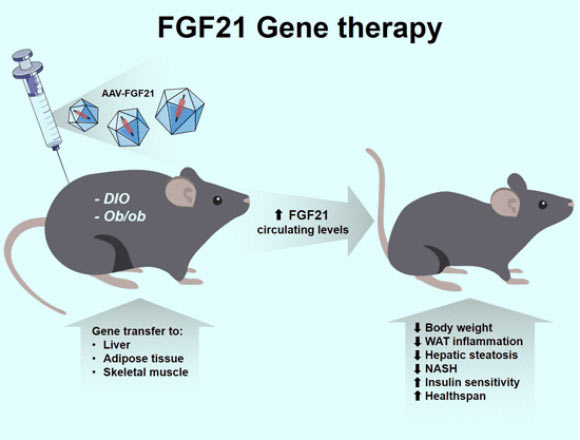A team of researchers from the Autonomous University of Barcelona, CIBERDEM and the Spanish National Cancer Research Centre has demonstrated that a single administration of adeno-associated viral vectors encoding a protein called the fibroblast growth factor 21 (FGF21) can counteract obesity, hepatic steatosis (fat content), and insulin resistance in diabetic mice, and can also prevent age-associated weight gain and insulin resistance in healthy animals. The study is published in the journal EMBO Molecular Medicine.

Jimenez et al describe the use of adeno-associated viral vectors to achieve long-term production of fibroblast growth factor 21 (FGF21) to treat obesity and insulin resistance. Image credit: Jimenez et al, doi: 10.15252/emmm.201708791.
The prevalence of type 2 diabetes is growing at an alarming rate, and the disease has become a major health problem worldwide.
Insulin resistance and type 2 diabetes are very strongly associated with obesity, whose prevalence is also increasing.
Obesity increases the risk of mortality and is also a very significant risk factor for heart disease, immune dysfunction, hypertension, arthritis, neurodegenerative diseases, and certain types of cancer.
Lifestyle intervention and conventional pharmacologic treatments have proven effective for many obese and type 2 diabetes patients. However, these therapeutic options are not successful in all cases and are not exempt of undesirable side effects.
“This is the first time that long term reversion of obesity and insulin resistance have been achieved upon a one-time administration of a gene therapy, in an animal model that resembles obesity and type 2 diabetes in humans,” said study first author Dr. Veronica Jimenez, a researcher at CIBERDEM and the Autonomous University of Barcelona.
“Our results demonstrate that it is a safe and effective therapy.”
In the study, Dr. Jimenez and co-authors took advantage of adeno-associated viral vectors (AAV) to genetically engineer liver, adipose tissue, or skeletal muscle, and obtain sustained circulating levels of the FGF21 protein.
“FGF21 is a hormone secreted naturally by several organs that acts on many tissues for the maintenance of correct energy metabolism,” they explained.
“By inducing FGF21 production through gene therapy the animal lost weight and decreased insulin resistance, which causes the development of type 2 diabetes.”
The researchers successfully tested the FGF21 gene therapy in two different mouse models of obesity, induced either by diet or genetic mutations.
In addition, they observed that when administered to healthy mice, the therapy promoted healthy aging and prevented age-associated weight gain and insulin resistance.
“After treatment with AAV-FGF21, mice lost weight and reduced fat accumulation and inflammation in adipose tissue; steatosis, inflammation and fibrosis of the liver were also reversed,” the scientists said.
“This led to an increase in insulin sensitivity and in healthy aging, without any adverse side effects.”
The administration of the FGF21 gene therapy protected against the risk of tumor formation in the liver in response to a hypercaloric diet for a prolonged period of time.
“AAV-mediated gene therapy has been approved in Europe and the United States for the treatment of several diseases, due to its efficacy and safety profile,” said study senior author Professor Fatima Bosch, also from the CIBERDEM and the Autonomous University of Barcelona.
“Similarly, there exists extensive clinical experience in applying AAV-mediated gene transfer to liver and skeletal muscle.”
“Consequently, the therapy described in this study constitutes the basis for the future clinical translation of FGF21 gene transfer to treat type 2 diabetes, obesity and related comorbidities.”
_____
Veronica Jimenez et al. FGF21 gene therapy as treatment for obesity and insulin resistance. EMBO Molecular Medicine, published online June 9, 2018; doi: 10.15252/emmm.201708791







